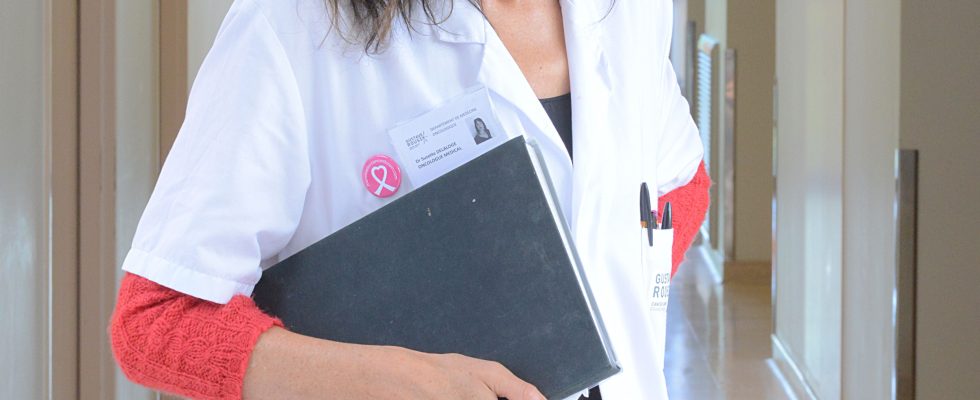A large pot of honey, a wooden statuette in the shape of a canoe, a hairless “chemotherapy” Barbie doll… Suzette Delaloge’s office is filled with objects donated by patients. “I received many other gifts, but they wouldn’t fit in this room!” smiles the oncologist, specialist in breast cancer at the Gustave-Roussy hospital in Villejuif.
This pale-complexioned brunette, whose face vaguely recalls that of the writer Amélie Nothomb, has been working in this internationally recognized cancer center for twenty-four years. She made prophylaxis her fight. In January 2021, she created Interception, a personalized prevention program for people at high risk of developing a tumor. Participants come to “intercept” the disease, that is to say, to identify it at an early stage or, better, to prevent it from occurring. “Oncology has been based since its beginnings on a therapeutic vision where treatments are designed for already advanced diseases, but without preventive medications,” regrets Suzette Delaloge.
However, the benefit of acting early is immense. “The longer we wait, the more the cancer grows and mutates. It becomes more and more complex and resistant, while the body’s defenses weaken,” recalls the 56-year-old scientist, standing at 1.70 meters tall. -new, long red hair, leather pants. His roadmap: detect the disease as soon as possible, treat it early enough to avoid any operation, and be satisfied with a “very short” treatment, lasting a few months. The program is accompanied by a mobile application, MyInterception, which provides information, nutrition advice, physical activity recommendations, exam reminders, etc. It also allows you to be put in contact with people in similar situations. . Having proven itself within Gustave-Roussy, Interception convinced the Unicancer federation, which brings together regional centers fighting this disease. Thanks to public funding, the program will be duplicated in around ten French hospitals.
“A great life lesson”
Because she has valuable expertise, Suzette Delaloge only follows, as a doctor, people with cancer. This mother of two children, neither of whom has studied medicine, sees 400 to 500 women – but also a few men – each year undergoing active treatment for breast tumors. She establishes a bond with patients that visibly goes well beyond the simple medical relationship. “They entrust me with very heavy things. I tell them good and bad news. Some cry with joy when they learn of their remission,” confides the oncologist. Even more than her teachers, she has a strong admiration for her patients, some of whom go through the illness “with a courage and dignity that command respect, worrying about how I am doing while they are dying” . She evokes with emotion this young man whom she had treated during her internship and who died of metastatic melanoma at the age of 25 – she was the same age as him: “By fighting to the end, he gave me a great life lesson. The outcome seemed so unfair to me, but I had to return to work…”
A fan of walking and concerts at the Maison de la radio et de la musique, Suzette Delaloge, 56, wakes up every day at 5:30 a.m. This frees up time to also carry out research activities. Member of the international advisory committee of Lancet Oncology, author of 250 international publications, since 2019 she has coordinated the MyPeBS study which evaluates personalized breast cancer screening in 53,000 women in six European countries, Israel and France. In France, this study involves 650 general practitioners and specialists. It consists of comparing the journey of women following standard screening – a mammogram every two years – and others benefiting from personalized screening, where the frequency of examinations varies according to risk. The results will be published in 2027.
This large-scale observation constitutes a dream opportunity for the researcher, who studied for a little over a year at the University of Ottawa in the 1990s and retained a taste for ice skating, cross-country skiing and Canadian music (she is a fan of the folk group The Dead South). She always cultivates her international professional contacts. “The United States has Boston and the east coast. The annual congress of the American Society of Clinical Oncology (Asco), the annual high mass of oncologists, is held in Chicago. But it is Europe which dominates our specialty,” she says with satisfaction. She advocates greater integration between cancer centers in different countries, because “we progress more quickly by comparing and dialoguing with our neighbors. The United Kingdom, for example, is very inspiring in terms of research and organization of public health.
Analysis of new biomarkers, screening by blood test, radiography by artificial intelligence, the practitioner follows with interest the latest advances in her field. But remains lucid in the face of the continued growth in the incidence of cancer, despite the increasingly large sums invested in research. For Suzette Delaloge, this evolution is inherent to our consumer societies. “Air pollution, stress, junk food, all-plastic, a sedentary lifestyle, all these factors, linked to our lifestyles, increase the risks,” she criticizes. And to point out the harmful influence of industrial lobbies, but also the cost which has become prohibitive of healthy food: “It is our economic system which is to blame.” A dedicated scientist, who doesn’t hold her tongue in her pocket.
